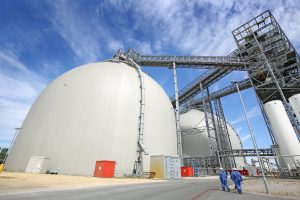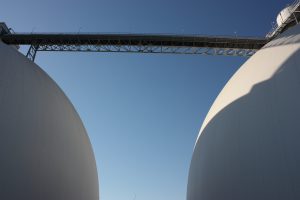The proposed Open Cycle Gas Turbine (OCGT) power station would produce up to 299 MW of electricity, enough to power the equivalent of about 150,000 homes.
It is intended to be able to be up and running quickly to provide back-up power to the National Grid during periods of peak demand, to support the growing number of renewable and low carbon energy sources.
As a rapid response and flexible power station it would not be operational all the time – it would be producing power for up to a maximum of 2,250 hours in a given year.
The development will contribute millions of pounds of investment into the local economy, create up to 15 full time skilled jobs once operational, and up to 150 jobs during the two-year construction period.
Local people were originally consulted on proposals for the power station in 2014, but the project was put on hold in 2015 due to market uncertainty. The project is now under the new ownership of the British energy company, Drax Group plc, and is once again being taken forward.
Andy Koss, Drax Power CEO, said: “As a result of what was learned during the consultation undertaken in 2014 and other studies, we have made a number of changes to the original proposals. For example, the cable for the electrical connection has been put underground instead of having an overhead line; we have selected an access route from the B4489 to the west of the site, and reduced the number of stacks from five to one.
“We are looking forward to sharing our latest plans at the public exhibitions next month and hearing what local people think about them before we finalise the scheme and submit a Development Consent Order application.”
Abergelli Power Limited is holding public consultation events from 7 February 2018 to 10 February 2018 at Lllangyfelach, Clydach, Tircoed and Felindre. Members of the project team will be on hand to discuss the proposals and consultation process.
The consultation will run from 16 January 2018 until 19 February 2018 and full information about the project, the public exhibitions and the preliminary findings of the environmental impact assessments will be available online on Abergelli Power here.
As the capacity of the power station is over 50 MW, the scheme is classified as a Nationally Significant Infrastructure Project, which means a Development Consent Order application will need to be submitted to the UK Secretary of State for Business, Energy and Industrial Strategy, who will make a decision on whether to give the plans the go ahead.
Subject to the public consultation, planning process and market conditions, the power station could be operational in 2022.
ENDS
For further information please contact Clare Jones on 07793382021 or email clare@grasshopper-comms.co.uk
Notes to the Editor:
About Drax
Drax Group plc plays a vital role in helping change the way energy is generated, supplied and used as the UK moves to a low carbon future. Its 2,300-strong staff operate across three principal areas of activity – electricity generation, electricity sales to business customers and compressed wood pellet production.
The Group includes:
Drax Power Ltd, which operates the largest power station in the UK, based at Selby, North Yorkshire and supplies 7 percent of the country’s electricity needs. The energy firm converted from burning coal to become a predominantly biomass-fuelled electricity generator. Drax is the biggest single site renewable generator in the UK and the largest decarbonisation project in Europe.
Haven Power, based in Ipswich, provides businesses with electricity.
Opus Energy, based in Oxford, Northampton and Cardiff, provides electricity and gas to businesses.
Drax Biomass, is based in the US and manufactures compressed wood pellets produced from sustainably managed working forests.
For more information visit www.drax.com/us
About the Project
Further information about the Development Consent Order application process can be viewed on the Planning Inspectorate’s website at https://infrastructure.planninginspectorate.gov.uk/.
Dates of public exhibitions
- 7th February 2018: 16.00 – 19.00 at Llangyfelach Church Hall, Swansea Road, Llangyfelach, Swansea SA5 7JA
- 8th February 2018: 15.30 – 18.30 at Forge Fach Resource Centre, Hebron Road, Clydach, Swansea SA6 5EJ
- 9th February 2018: 17.00 – 20.00 at Tircoed Village Hall, Y Cyswllt, Tircoed SA4 9QZ
- 10th February 2018: 10.00 – 13.00 at Felindre Welfare Hall, Felindre, Swansea SA5 7NA








